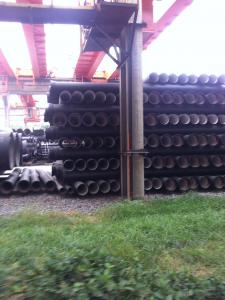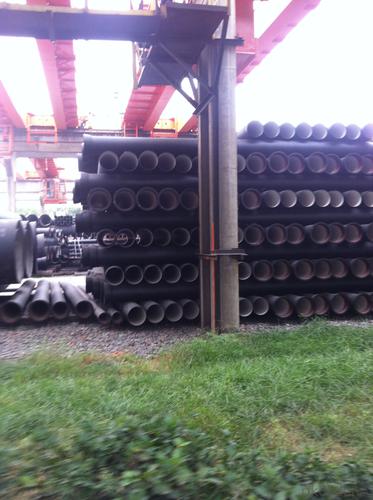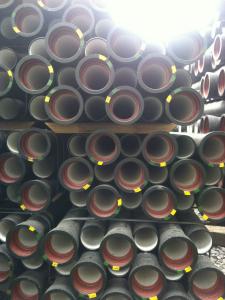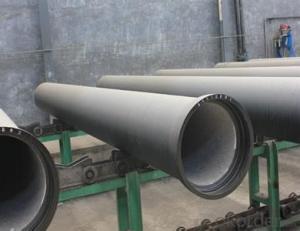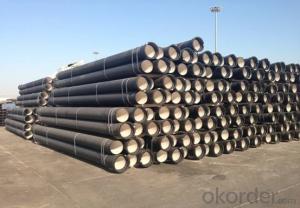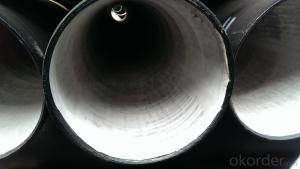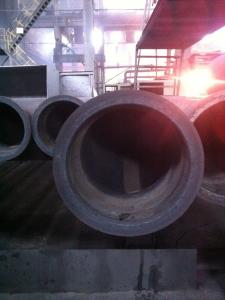DUCTILE IRON PIPES AND PIPE FITTINGS K9 CLASS DN1500
- Loading Port:
- Tianjin
- Payment Terms:
- TT OR LC
- Min Order Qty:
- 22 pc
- Supply Capability:
- 3000 pc/month
OKorder Service Pledge
OKorder Financial Service
You Might Also Like
Material : Ductile Cast Iron
Size Range : DN 80mm to DN 2000mm
Unit Effective Length : 6m or 5.7m
Manufacture Standard: ISO 2531:1998/ EN 545:2006/EN 598:2007
Annual capacity : 200,000 tons
Coating Exterior: Zinc 130g/m2 according to ISO 8179-1 and bitumen coating 70 microns.
Cement Interior: Portland Cement/ High Alumina Cement/ Sulphate Resisting Cement Lining according to ISO 4179
Special requirements on external coating and internal lining can be applied
We also provide accessories such as SBR/EPDM rubber gaskets, lubricant paste, pipe caps, PE sleeves, etc.
Additional Parts:
Each pipe is strictly inspected according to related standard to ensure permanently high performance.
Easy Installation at site and service free for life
Long Service Lifespan
Quotation will arrive you within 24hours once we get your inquiry.
We guarantee offering you a competitive price.
A copy of original inspection reports of pipes will be offered after shipment.
Photos of loading process will be sent to the customer after shipment effect.
We will follow-up the delivery progress after shipment effect and update to the customer on weekly basis.
- Q: What are the differences between ductile cast iron pipes and centrifugal ductile iron pipes?
- Centrifugal casting is a casting method. Ball milling cast iron pipe is a kind of material.
- Q: How does ductile iron pipe perform in high-temperature environments?
- Ductile iron pipe performs well in high-temperature environments due to its superior strength and thermal resistance. It can withstand elevated temperatures without significant deformation or structural damage, making it a reliable choice for various applications requiring high-temperature resistance.
- Q: Can ductile iron pipes be used for irrigation systems in saline soil conditions?
- Yes, ductile iron pipes can be used for irrigation systems in saline soil conditions. Ductile iron pipes are known for their durability and corrosion resistance, making them suitable for various soil conditions, including saline soil. Saline soil contains high levels of salt, which can cause corrosion and deterioration of certain materials. However, ductile iron pipes have a protective coating, such as cement mortar lining or polyethylene encasement, which provides an additional layer of protection against corrosion. This ensures that the pipes can withstand the corrosive effects of saline soil and maintain their structural integrity over a long period of time. Additionally, ductile iron pipes have a high tensile strength, making them resistant to cracks and breaks, which is important for irrigation systems that require a continuous and reliable water supply. Therefore, ductile iron pipes are a suitable choice for irrigation systems in saline soil conditions.
- Q: It's not easy to drill ductile iron with cobalt high speed steel bit. Please help to point it out
- Determine the authentic M35 cobalt bit, which is about 65HRC in hardness. General workpiece hardness of about 45HRC or less of the problem.
- Q: What are the advantages of using ductile iron pipes?
- There are several advantages of using ductile iron pipes. Firstly, they have high tensile strength and durability, making them resistant to cracking and breaking under pressure or external forces. Secondly, ductile iron pipes have excellent corrosion resistance, allowing them to withstand harsh environments and reducing the risk of leaks and pipe failures. Additionally, they provide better flow characteristics due to their smooth internal surface, ensuring efficient transportation of fluids. Lastly, ductile iron pipes have a long lifespan and require minimal maintenance, resulting in cost savings and reliable infrastructure for water supply and wastewater management systems.
- Q: Are ductile iron pipes suitable for bridge piers or abutments?
- Ductile iron pipes are indeed appropriate for bridge piers or abutments. This material, known for its strength and durability, is extensively utilized in diverse infrastructure undertakings, such as bridges. It possesses exceptional mechanical characteristics, including remarkable tensile strength and impact resistance, rendering it capable of withstanding substantial loads and external forces. Moreover, ductile iron pipes exhibit high resistance to corrosion and enjoy a lengthy service life, which is crucial for structures like bridge piers or abutments that face harsh environmental conditions. The adaptability and dependability of ductile iron pipes deem them a fitting choice for supporting and fortifying bridge structures, ensuring their safety and longevity.
- Q: What is the expected surge pressure rating of ductile iron pipes?
- The expected surge pressure rating of ductile iron pipes can vary depending on various factors such as the diameter and thickness of the pipe, the type of joint used, and the specific manufacturer's specifications. However, ductile iron pipes are generally designed to withstand surge pressures between 150% to 200% of their working pressure rating. This means that if a ductile iron pipe has a working pressure rating of, for example, 250 psi, it can typically handle surge pressures of up to 375 psi to 500 psi. It is important to consult the manufacturer's specifications and guidelines for accurate surge pressure ratings specific to the ductile iron pipes being used.
- Q: What is the expected abrasion resistance of ductile iron pipes?
- The expected abrasion resistance of ductile iron pipes is generally high. Ductile iron pipes are known for their durability and strength, making them suitable for various applications, including transporting water, sewage, and other fluids. The material composition of ductile iron pipes, which includes a significant amount of carbon and silicon, contributes to their abrasion resistance. Ductile iron pipes are designed to withstand the abrasive forces that can occur during the transportation of fluids. They have a smooth internal surface that reduces friction and minimizes the potential for abrasion. Additionally, the material's inherent toughness and resistance to wear and tear make ductile iron pipes less prone to damage caused by abrasive particles or debris in the flowing fluid. However, it is important to note that the expected abrasion resistance of ductile iron pipes can also depend on various factors such as the velocity and nature of the fluid being transported, the presence of corrosive substances, and the installation conditions. In some cases, additional protective measures such as linings or coatings may be required to enhance the pipes' resistance to abrasion. Overall, ductile iron pipes are known for their excellent abrasion resistance, but it is always advisable to consider specific application requirements and consult with experts to ensure the appropriate selection and installation of the pipes for optimal performance and longevity.
- Q: What if the ductile iron pipe is broken?
- Ductile iron pipes can be broken with a large piece of repair sectionIn the medium and low pressure pipe network, nodular cast iron pipe has the advantages of safe operation, low breakage rate, convenient construction and maintenance, excellent corrosion resistance, etc..
- Q: Ductile iron 600-3 grade, tensile strength, how to test, there is a simple way?
- 600-3 is pearlite + a small amount of ferrite matrix ductile iron. Pearlite edge region. 10%, center. 70600-3. Two sets of numbers indicating the grades and mechanical properties of nodular cast iron. The former represents the minimum tensile strength
Send your message to us
DUCTILE IRON PIPES AND PIPE FITTINGS K9 CLASS DN1500
- Loading Port:
- Tianjin
- Payment Terms:
- TT OR LC
- Min Order Qty:
- 22 pc
- Supply Capability:
- 3000 pc/month
OKorder Service Pledge
OKorder Financial Service
Similar products
Hot products
Hot Searches
Related keywords
